裕兴新概念学习笔记 第一册31-32
新概念英语第一册31-32课(第二课时)
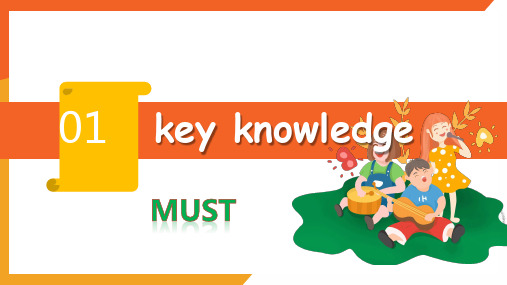
现在进行时: 否定句结构: 主语+ am/is/are not + 动词ing +其他
I am not eating. You/ We/ They are not eating. He/ She/ It is not eating.
现在进行时的否定句就是
在be动词后面加not。
①她现在没看报纸。 She is not reading a newspaper. ②他的弟弟没在扫地。 His brother is not sweeping the floor. ③他们没在看电视。 They are not watching TV. ④我没在穿外套。 I am not putting on my coat. ⑤我们没在看一只猫。 We are not looking at the cat.
glass
basket 篮子 /ba:skit/
篮球 basket balle is YaoMing.
He is hoopman.
who pron.谁
Who is there? 谁在那? Who is your teacher? 谁是你的老师? Who is that? 谁来了?/谁的电话?
现在进行时: 一般疑问句结构:
Is/Are + 主语 + 动词ing +其他
Are you we/ they eating ? Is he/ she/ it eating?
一般疑问句和回答
问句, 直接把be提前,
Are you drawing ?
Is he standing?
肯定回答: Yes, 主语+be. 否定回答: No, 主语+be+not. Yes, I am./ No, I’m not. Yes,he is. / No, he isn’t.
新概念英语第一册课后练习题及答案:31-32
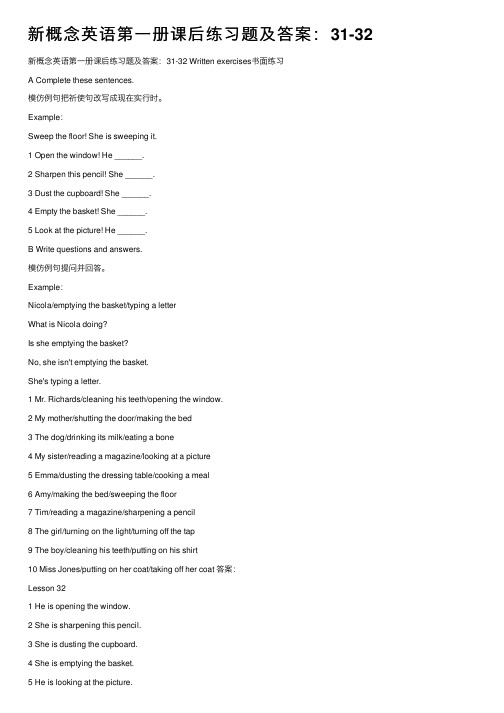
新概念英语第⼀册课后练习题及答案:31-32新概念英语第⼀册课后练习题及答案:31-32 Written exercises书⾯练习A Complete these sentences.模仿例句把祈使句改写成现在实⾏时。
Example:Sweep the floor! She is sweeping it.1 Open the window! He ______.2 Sharpen this pencil! She ______.3 Dust the cupboard! She ______.4 Empty the basket! She ______.5 Look at the picture! He ______.B Write questions and answers.模仿例句提问并回答。
Example:Nicola/emptying the basket/typing a letterWhat is Nicola doing?Is she emptying the basket?No, she isn't emptying the basket.She's typing a letter.1 Mr. Richards/cleaning his teeth/opening the window.2 My mother/shutting the door/making the bed3 The dog/drinking its milk/eating a bone4 My sister/reading a magazine/looking at a picture5 Emma/dusting the dressing table/cooking a meal6 Amy/making the bed/sweeping the floor7 Tim/reading a magazine/sharpening a pencil8 The girl/turning on the light/turning off the tap9 The boy/cleaning his teeth/putting on his shirt10 Miss Jones/putting on her coat/taking off her coat 答案:Lesson 321 He is opening the window.2 She is sharpening this pencil.3 She is dusting the cupboard.4 She is emptying the basket.5 He is looking at the picture.B1 What is Mr. Richards doing?Is he cleaning his teeth?No, he isn't cleaning his teeth.He's opening the window.2 What is my mother doing?Is she shutting the door?No, she isn't shutting the door.She's making the bed.3 What is the dog doing?Is it drinking its milk?No, it isn't drinking its milk.It's eating a bone.4 What is my sister doing?Is she reading a magazine?No, she isn't reading a magazine.She's looking at a picture.5 What is Emma doing? Is she dusting the dressing table? No, she isn't dusting the dressing table.She's cooking a meal.6 What is Amy doing?Is she making the bed?No, she isn't making the bed.She's sweeping the floor.7 What is Tim doing?Is he reading a magazine?No, he isn't reading a magazine.He's sharpening a pencil.8 What is the girl doing?Is she turning on the light?No, she isn't turning on the light. She's turning off the tap.9 What is the boy doing?Is he cleaning his teeth?No, he isn't cleaning his teeth.He's putting on his shirt.10 What is Miss Jones doing?Is she putting on her coat?No, she isn't putting on her coat. She's taking off her coat.。
新概念一册31--32课

New words
1、garden 2、under 3、tree 4、climb 5、who 6、run 7、grass
7、grass 8、after 9、across 10、cat 11、type 12、letter 13、basket 14、eat
15、bone 16、clean 17、tooth 18、cook 19、milk 20、meal 21、drink 22、tap
“
没有进行时的动词 (作为了解)
表示状态、思想、感情和感觉的动词,不能表示正 在进行的动作。
“
1. 表示感觉,感官的词。 see, hear, like, love, want,
2. have, has当”拥有”讲时没有进行时。
“
三、选择
1. Look. Lucy is_____ a new bike today. A. jumping B. running C. riding D taking 2. The children _____ football. A. is playing B. are playing C. play the D. play a 3. They ______TV in the evening. They do their homework. A. are watching B. can’t watching C. don’t watch D. don’t watching 4. Listen! She____ in the classroom. A. is singing B. sing C .to sing D. is sing 5. ___are you eating? I’m eating _____ meat. A. What, some B. Which, any C. Where, not D. What ,a
裕兴新概念学习笔记-第一册31-32
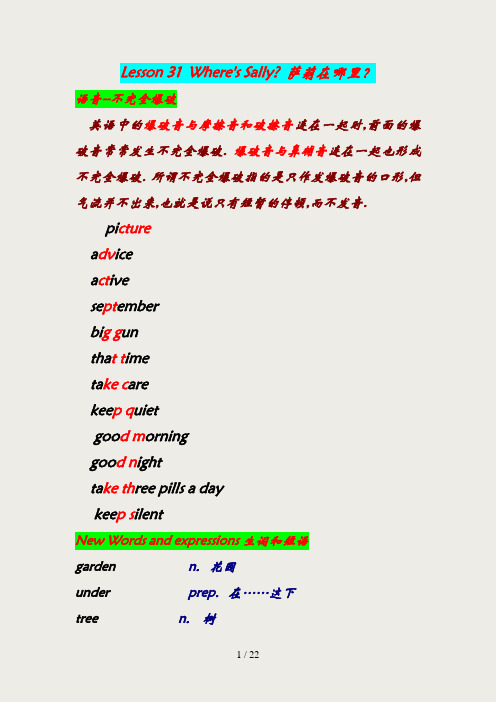
Lesson 31 Where's Sally? 萨莉在哪里?语音--不完全爆破英语中的爆破音与摩擦音和破擦音连在一起时,前面的爆破音常常发生不完全爆破. 爆破音与鼻辅音连在一起也形成不完全爆破. 所谓不完全爆破指的是只作发爆破音的口形,但气流并不出来,也就是说只有短暂的停顿,而不发音.pi cturea dv icea ct ivese pt emberbi g g untha t t imeta ke c arekee p q uietgoo d m orninggoo d n ightta ke th ree pills a daykee p s ilentNew Words and expressions 生词和短语garden n. 花园under prep. 在……这下tree n. 树climb v. 爬,攀登(b不发音) who pron. 谁run v. 跑grass n. 草,草地after prep. 在……之后across prep. 横过,穿过cat n. 猫garden center:花卉中心garden city:花园城市savage garden:野人花园in the garden:在花园里under the tree:在树下family tree:家谱tree ring:年轮climb the tree:爬树run across the grass:跑过草地run after 在……之后跑garden n. 花园 (自家花园)park n. 公园 (公共地方)eg. There is a garden behind the house.在房子的后面有一个花园.My home is near the park.我家靠近公园.under prep. 在....之下eg. There is a pair of shoes under the bed eg. Those shoes are under the bed.在床的下面有一双鞋.tree n. 树an apple tree 一颗苹果树clothes tree 挂衣架climb the tree 爬树climb v. 爬,攀登( b 哑音)climb the tree 爬树eg. don't climb the tree.不要爬树climb the hill 爬山who pron, 谁 (引导疑问句)eg. Who's there?谁在哪?Who is your teacher?谁是你的老师?Who's that?谁啊?run v. 跑eg. He is running fast.他正飞快的跑着.grass n. 草, 草地on the grass 在草地上after prep. 在...之后run after 追逐...eg. A dog is running after a cat.一只狗正在追一只猫.after beauty. 女士优先after age. 老者优先across prep. 横过,穿过run across 跑着横穿过eg. A girl is running across the grass.一个女孩跑着横穿过草地.swim across the river横着游过这条江walk across the street横穿街道through prep. 穿过(在物体内部穿过) walk through走着穿越walk through the forest步行穿过森林cat n. 猫eg. Who let the cat out of the bag? 谁泄密了?Don't let the cat out of the bag. 不要泄密?rain cats and dogs : rain heavily 下倾盆大雨eg. Like a cat on hot bricks.热锅上的蚂蚁.Grammar ----- 语法present continuous tense 现在进行式结构: be + v. + ing be 随人称变化 ( am, is , are )1. 此时此刻正在进行或发生的动作,时间状语一般用new, at the moment.eg. Jane is reading a book now.简正在读一本书.My father is watching TV at the moment.我的爸爸正在看电视.2. 现阶段的一段时间正在进行或发生的动作,但说话的此刻动作不一定正在进行着, 时间状语通常是recently, these days.----- What are you doing recently?你最近忙些什么?I am studying english at a school.我目前在学校学英语.He is making the plan these days.这段时间他一直忙着他的计划书.3. 现在进行时后面加一个表示将来的时间状语,比如, tomorrow, soon等等,就可以表示将来的一种打算.eg. I am seeing my friend this afternoon.今天下午我要去见我的朋友.结构: be + v. + ing be 随人称变化 ( am, is , are )1. She is reading a newspaper now.她正在读报纸.2. His brother is climbing the tree.他弟弟正在爬树.3. They are watching TV.他们正在看电视.4. I am putting on my coat.我正在穿外套.5. We are looking at the cat.我们在看那只猫.疑问句把系动词提前1. Is she reading a newspaper?Yes, she is.No, she isn't2. Is his brother climbing the tree?Yes, he is.No, he isn't3. Are they watching TV?Yes, they are.No, they aren't.4. Are you putting on your coat?Yes, I am.No, I'm not.否定句在系动词后面加not.1. She is not reading a newspaper.2. His brother isn't climbing the tree.3. They aren't watching TV.4. I'm not putting on my coat.5. We are not looking at the cat.动词+ ing 的规则1. v. + ingclimb ----------- climbingsweep ----------- sweepingdust ----------- dustingread ------------ reading2. 以辅音字母加不发音的-e 结尾的单词, 把"e" 去掉加ing.make --------- makingshine -------- shiningshave -------- shavingtake -------- taking3. 以重读闭音节结尾并且词尾只有一个辅音字母的单词,双写最后一个辅音字母,再加-ing. 三个条件:1). 必须是以闭音节结尾(如: break, speed, slow 就不可双写)2). 结尾的音节必须是重读音节( water 不可双写)3. 词尾只能有一个辅音字母( push 不可双写 )put ------ puttingsit ------ sittingbegin ------ beginningrun ------ runningget ------ gettingTEXT 课文Where is Sally? Sally 在哪里?JEAN: Where's Sally, Jack?琼:杰克,萨莉在哪儿?JACK: She's in the garden, Jean.杰克:她在花园里,琼。
新概念课堂笔记 第一册 Lesson 31-32

新概念英语课堂笔记第一册Lesson 31-32garden【用法】n. 花园,庭院【扩展】gardener园丁gardening园艺【词组】vegetable garden菜园子under【用法】prep. 在……之下,在……正下方【辨析】over <反> under:指在物体的正上方或正下方,外表不接触;above <反> below:指在物体的上方或下方,外表不接触;on <反> beneath:指在物体的外表上或下,外表接触。
【扩展】underground adj. 地下的underwear n. 内衣tree【用法】n. 树【辨析】in the tree在树上,表示把物体放在树上或物体停留在树上。
on the tree在树上,表示长在树上,比方树叶,果子等。
climb【用法】v. 爬,攀登【词组】go climbing去爬山climb the mountain爬山climb down爬下来climb up爬上去【扩展】climber爬山者,爬山运发动who【用法】pron. 谁〔疑问代词〕引导特殊疑问句。
who的宾格形式为:whom〔谁〕;所有格形式为:whose〔谁的〕【例句】Who is that girl?那个女孩是谁?run【用法】v. 跑;经营,管理【词组】run after追逐,追赶run away逃走run away with sb. 带人私奔run away with sth. 携物潜逃run out of从……跑出来run into跑进……里run a hotel/a school管理旅馆,学校after【用法】prep. 在……之后【词组】day after day日复一日after that下一步,然后【反义】before 在……之前【辨析】after和behind〔在……后面〕after指时间的先后及顺序的先后behind指位置的前后【例句】After you, please. 你先请I will do my homework after dinner.晚饭后我要做作业。
裕兴新概念英语第一册笔记(完整版)
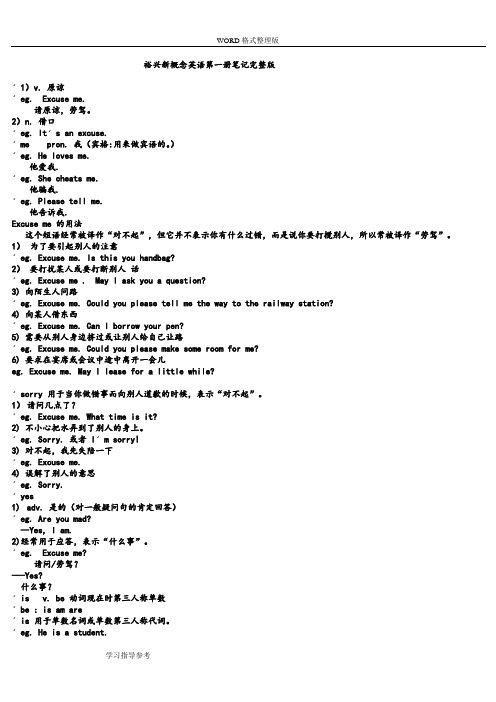
裕兴新概念英语第一册笔记完整版΄1)v. 原谅΄eg. Excuse me.请原谅,劳驾。
2)n. 借口΄eg. It΄s an excuse.΄me pron. 我(宾格:用来做宾语的。
)΄eg. He loves me.他爱我.΄eg. She cheats me.他骗我.΄eg. Please tell me.他告诉我.Excuse me 的用法这个短语经常被译作“对不起”,但它并不表示你有什么过错,而是说你要打搅别人,所以常被译作“劳驾”。
1)为了要引起别人的注意΄eg. Excuse me. Is this you handbag?2)要打扰某人或要打断别人话΄eg. Excuse me . May I ask you a question?3) 向陌生人问路΄eg. Excuse me. Could you please tell me the way to the railway station?4) 向某人借东西΄eg. Excuse me. Can I borrow your pen?5) 需要从别人身边挤过或让别人给自己让路΄eg. Excuse me. Could you please make some room for me?6) 要求在宴席或会议中途中离开一会儿eg. Excuse me. May I lease for a little while?΄sorry 用于当你做错事而向别人道歉的时候,表示“对不起”。
1)请问几点了?΄eg. Excuse me. What time is it?2) 不小心把水弄到了别人的身上。
΄eg. Sorry. 或者 I΄m sorry!3) 对不起,我先失陪一下΄eg. Excuse me.4) 误解了别人的意思΄eg. Sorry.΄yes1)adv. 是的(对一般疑问句的肯定回答)΄eg. Are you mad?--Yes, I am.2)经常用于应答,表示“什么事”。
新概念英语第一册-第31-32课(共38张PPT)

• 6. I_____________(sing) an English song.
• 7. What________he__________(read)? • 8. He______________(make) a toy car. • 9. These girls ___________ (dance). • 10. My mother_____________(cook) in
注no意w(:现能在用在,进H一行o般时m放态e句中w末的o提rk示词有:
look/listen(看/听),一般放句首, 引起说话人的注意
eg: We are playing games now. Look!A bird is flying. Listen!The girl is singing.
Lesson31
Where’s Sally?
• garden • under • tree • climb • who • run • grass • after • across • cat
New words 生词
n. 花园 prep. 在……之下 n. 树 v. 爬,攀登 pron. 谁 v. 跑 n. 草,草地 prep. 在……之后 prep. 横过,穿过 n. 猫
• JEAN: What about the dog? 那么狗呢?
• What about … 相当于 how about …,意思是 “关于……呢?……如何呢?” ,常用在向 对方提建议或询问天气、身体状况等情况下, 后可接名词、代词、及动词ing形式
• 试翻译下列句子: • What about some cakes? • 再吃块蛋糕好吗? • I am from Beijing. What about you? • 我是北京人,你呢? • What about playing football? • 去踢足球怎么样?
裕兴新概念第一册笔记
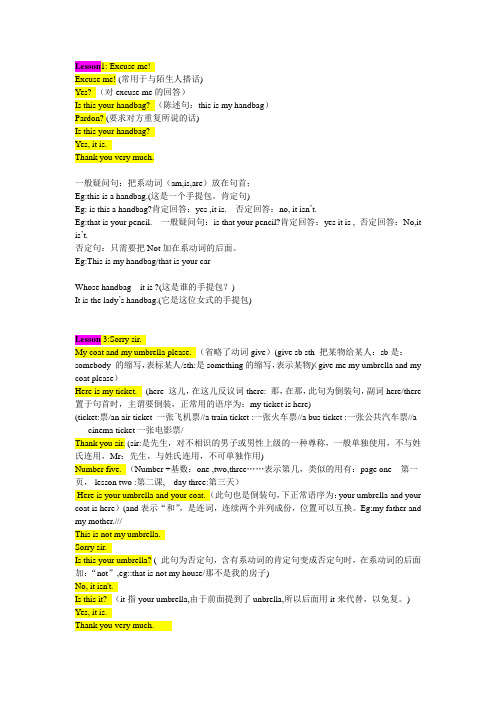
Lesson1: Excuse me!Excuse me! (常用于与陌生人搭话)Yes? (对excuse me的回答)Is this your handbag? (陈述句:this is my handbag)Pardon? (要求对方重复所说的话)Is this your handbag?Yes, it is.Thank you very much.一般疑问句:把系动词(am,is,are)放在句首;Eg:this is a handbag.(这是一个手提包。
肯定句)Eg: is this a handbag?肯定回答:yes ,it is. 否定回答:no, it isn‟t.Eg:that is your pencil. 一般疑问句:is that your pencil?肯定回答:yes it is , 否定回答:No,it is‟t.否定句:只需要把Not加在系动词的后面。
Eg:This is my handbag/that is your carWhose handbag it is ?(这是谁的手提包?)It is the lady‟s handbag.(它是这位女式的手提包)Lesson 3:Sorry sir.My coat and my umbrella please. (省略了动词give)(give sb sth 把某物给某人:sb是:somebody 的缩写,表标某人/sth:是something的缩写,表示某物)(give me my umbrella and my coat please)Here is my ticket. (here 这儿,在这儿反议词there: 那,在那,此句为倒装句,副词here/there 置于句首时,主谓要倒装,正常用的语序为:my ticket is here)(ticket:票/an air ticket 一张飞机票//a train ticket :一张火车票//a bus ticket :一张公共汽车票//a cinema ticket一张电影票/Thank you sir. (sir:是先生,对不相识的男子或男性上级的一种尊称,一般单独使用,不与姓氏连用,Mr:先生,与姓氏连用,不可单独作用)Number five. (Number +基数:one ,two,three……表示第几,类似的用有:page one 第一页, lesson two :第二课, day three:第三天)Here is your umbrella and your coat. (此句也是倒装句,下正常语序为:your umbrella and your coat is here)(and表示“和”,是连词,连续两个并列成份,位置可以互换。
裕兴新概念英语笔记第1册到第3册精品笔记--可编辑
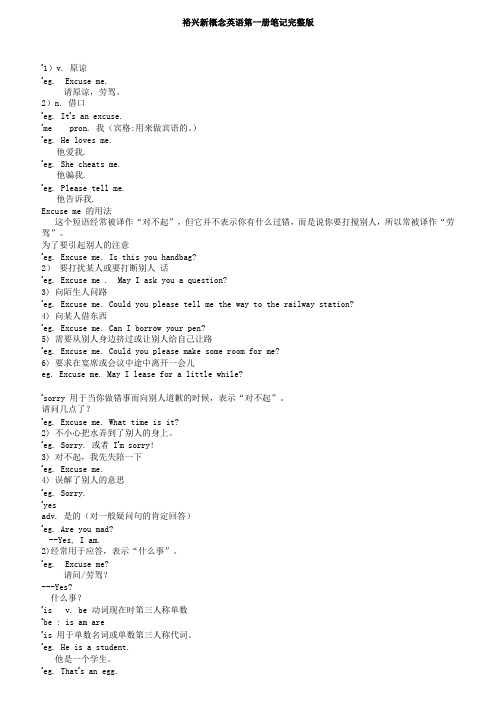
裕兴新概念英语第一册笔记完整版΄1)v. 原谅΄eg. Excuse me.请原谅,劳驾。
2)n. 借口΄eg. It΄s an excuse.΄me pron. 我(宾格:用来做宾语的。
)΄eg. He loves me.他爱我.΄eg. She cheats me.他骗我.΄eg. Please tell me.他告诉我.Excuse me 的用法这个短语经常被译作“对不起”,但它并不表示你有什么过错,而是说你要打搅别人,所以常被译作“劳驾”。
为了要引起别人的注意΄eg. Excuse me. Is this you handbag?2)要打扰某人或要打断别人话΄eg. Excuse me . May I ask you a question?3) 向陌生人问路΄eg. Excuse me. Could you please tell me the way to the railway station?4) 向某人借东西΄eg. Excuse me. Can I borrow your pen?5) 需要从别人身边挤过或让别人给自己让路΄eg. Excuse me. Could you please make some room for me?6) 要求在宴席或会议中途中离开一会儿eg. Excuse me. May I lease for a little while?΄sorry 用于当你做错事而向别人道歉的时候,表示“对不起”。
请问几点了?΄eg. Excuse me. What time is it?2) 不小心把水弄到了别人的身上。
΄eg. Sorry. 或者 I΄m sorry!3) 对不起,我先失陪一下΄eg. Excuse me.4) 误解了别人的意思΄eg. Sorry.΄yesadv. 是的(对一般疑问句的肯定回答)΄eg. Are you mad?--Yes, I am.2)经常用于应答,表示“什么事”。
新概念第一册31课笔记
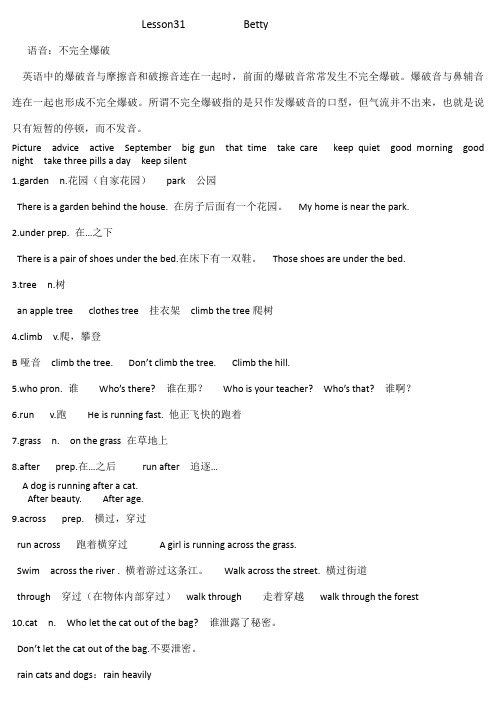
Lesson31 Betty语音:不完全爆破英语中的爆破音与摩擦音和破擦音连在一起时,前面的爆破音常常发生不完全爆破。
爆破音与鼻辅音连在一起也形成不完全爆破。
所谓不完全爆破指的是只作发爆破音的口型,但气流并不出来,也就是说只有短暂的停顿,而不发音。
Picture advice active September big gun that time take care keep quiet good morning good night take three pills a day keep silent1.garden n.花园(自家花园)park 公园There is a garden behind the house. 在房子后面有一个花园。
My home is near the park.2.under prep. 在…之下There is a pair of shoes under the bed.在床下有一双鞋。
Those shoes are under the bed.3.tree n.树an apple tree clothes tree 挂衣架climb the tree爬树4.climb v.爬,攀登B哑音climb the tree. Don’t climb the tree. Climb the hill.5.who pron. 谁Who’s there? 谁在那?Who is your teacher? Who’s that? 谁啊?6.run v.跑He is running fast. 他正飞快的跑着7.grass n. on the grass 在草地上8.after prep.在…之后run after 追逐…A dog is running after a cat.After beauty. After age.9.across prep. 横过,穿过run across 跑着横穿过 A girl is running across the grass.Swim across the river . 横着游过这条江。
新概念英语第一册Lesson31-32
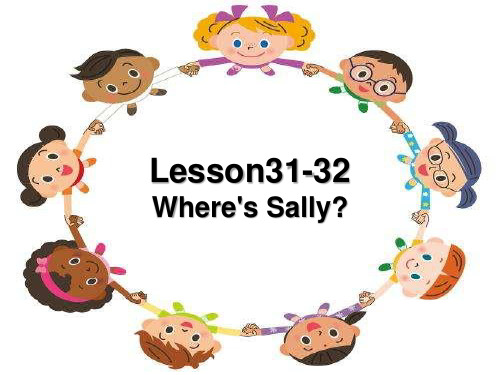
Yes, she is. No, she isn't.
Who What...doing Where
1. 肯定句
They are swimming in the river.
2. 否定句
They aren't swimming in the river.
Text
Jean: Where's Sally? Jack:She's in the __g_a_r_d_en__, Jean. Jean: What___is____ she ____d_o_in_g___? Jack: She ____is____ ____s_it_ti_ng_____ under the tree.
I watch TV. I am watching TV.
We clean the room. We are cleaning the room.
She plays the guitar. She is playing the guitar.
He types a letter. He is typing a letter
eat soup
o e n. 骨头
v. 清洗
clean the blackboard
clean the room
oo
ee
There are some ________ in the kitchen. I am _________.
My father is a _______.
ea
He is ________(have) a meal.
花园 在......之下 树 爬,攀登 谁 跑 草,草地 在......之后 横过,穿过 猫
新版新概念英语第一册第31课课堂笔记

Lesson 93 Our new neighbour [词汇] pilot n. 飞⾏员 return v. 返回 New York n. 纽约 Tokyo n. 东京 Madrid n. 马德⾥ fly (flew, flown) v. 飞⾏ [P192] Athens n. 雅典 [5AWinz] Berlin n. 柏林 [bE:5lin] Bombay n. 孟买 [bCm5bei] Geneva n. ⽇内⽡ [dVi5ni:vE] Moscow n. 莫斯科 [5mCskEu] Rome n. 罗马 [rEum] Seoul n. 汉城 [sEul] Stockholm n. 斯德哥尔摩 [5stCkhEum] Sydney n. 悉尼 [5sidni] [词汇·略] return ticket 往返车票 return to return from I will return to Beijing next week. They have already returned to Shanghai. My mother returned to Beijing last week. My father will return from Hongkong next week. Nigel has already returned from Bombay. He returned from Bombay last week. next-door neighbour 隔壁邻居 the Royal Air Force 英国皇家空军 What is Nigel's job? How old is Nigel? Has he ever been to a lot of places in the world? What about his wife? Does his wife travel a lot? What does she usually do? Where is Nigel now? When will he return to London? When will he go to New York? Where is Madrid? When did Nigel go to Spain? How did he go there? Where will he go next week? What about next month? How will he go there? What about the month after next? Lesson 94 When did you/will you go to …? Written exercises 书⾯练习A page 192 last week, last month, last year this week, this month, this year next week, next month, next year the week after next, the month after next, the year after next 1 He will go to New York next week. 2 She will go to Sidney next month. 3 I will go to Paris the year after next. 4 We will go to Stockholm next year. 5 They will go to Geneva the week after next. Written exercises 书⾯练习B page 192 1 No, she won't return to Geneva next year. She'll return to Bombay. 2 No, I won't fly to London tomorrow. I'll fly to Geneva. 3 No, we won't go to Madrid next year. We'll go to London. 4 No, he won't arrive from Moscow next month. He'll arrive from Madrid. 5 No, they won't stay in New York next month. They'll stay in Moscow. 补充材料 page 26 shall, will, shan't, won't I shall go to Paris tomorrow morning. He will fly to Rome in two days' time. Will you visit the palace the day after tomorrow? No, I shan't visit it. I shall visit a museum. had better/ 'd better I had better finish my Homework first. You'd better zip your mouth. 1 has bought, bought, will arrive, have 2 will, arrive (in five hours 五个⼩时后) 3 have, been 4 will, arrive 5 stays 6 go, don't want 7 is flying 8 have 9 Has, moved 10 will have/had。
新概念英语第一册Lesson31-32

Tom is playing football.
Lucy is reading a book.
They are watching TV. He is standing.
What is she doing? She is climbing the tree (now).
Is she climbing the tree (now)?
重读闭音节三要素:
Lesson 32
What’s he /she /it doing? 他/ 她/它正在做什么?
clean tooth
(teeth) cook meal drink tap type
letter
basket eat
bone
milk
万 十万 百万的表达方式
What about the dog? The dog’s in the garden, too. It’s running across the grass. It’s running after a cat.
现在进行时
主语+be动词(am/is/are)+
动词现在分词
Be+V-ing
现在进行时表示正在发生或进行的动作。 现在进行时表示动作发生的时间是“现在”。 动作目前的状态是“正在进行中”。 所谓“正在进行中”,是指在谈到这件事的 时候,这个动作还在进行中。 注:“正在进行时”的事件,可能发生几年 了,也可能只有几分钟。仍在进行中是“现 在进行时”的关键。
No, they aren’t.
用现在进行时完成下列句子:
Is talking 1. ______he_____________(talk) with me? are playing 2. We_______________(play) football now. are doing 3. What_________you__________(do)? am singing 4. I_____________(sing) an English song. is mending 5. What________he____________(mend)? is mending 6. He______________(mend) a car. are playing 7. These boys ___________ (play) tennis on the playground. is cooking 8. My mother_____________(cook) in the kitchen.
新概念英语第一册Lesson31-32WhereisSally(课件)
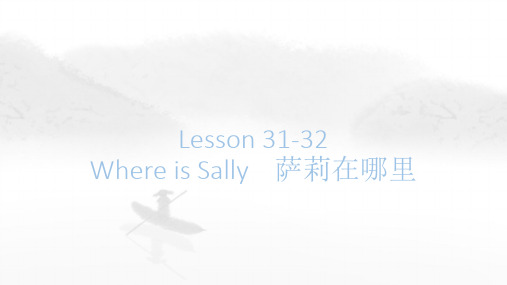
• type v.打字 • I am typing.
• letter n.信 • write letters • 写信 • letter字母
• basket .篮子 • in the basket在篮子里 • basketball篮球 • play basketball打篮球
• eat v.吃 • eat a cake • I am eating • have也可以表示吃 • have breakfast • have lunch • have dinner
• who /hu:/ pron.谁 • Who are you • Who is your teacher • Why • Where • When • How
• run 跑 • run with me • 跟我跑 • I am running • run fast
• grass /gra:s/ n.草,草地 • on the grass
• bone • 骨头 • lazy bones懒骨头
• clean /kli:n/ v.清洗 • clean the house 打扫房子 • clean the room
JEAN : Where7 s Sally, Jack JACK : She's in the garden, Jean. JEAN : What's she doing JACK : She's sitting under the tree. JEAN : Is Tim in the garden, too JACK : Yes, he is.
• tree /tri:/ n.树 • in the tree • on the tree(长在树上) • There are many trees along the street. • apple tree
裕兴新概念英语笔记:Lesson 32 What's he she it doing

Lesson 32 What's he/she/it doing?New words and expressions:type v.打字letter n.信basket n.篮子eat v.吃bone n.骨头clean v.清洗tooth n.(复数teeth)牙齿cook v.做(饭菜)milk n.牛奶meal n. 饭.一顿饭drink v.喝tap n. 水龙头type v.打字type a letter 打一封信eg. Nicola is typing a letter.type → typingtypist 打字员typewriter 打字机letter n.信write a letter 写一封信eg. I am writing a letter.write → writingletter box = mail box信箱basket n.篮子basketball 篮球play basketball 打篮球eg. We are playing basketball. 我们正在打篮球。
eat v.吃eat → eatingbone n.骨头(可数)eg. The dog is eating bones.lazy bones 懒骨头clean v.清洗clean the room 整理房间clean the car 洗车eg. His brother is cleaning the car. 他的兄弟正在洗车。
clean adj. ←→ dirty adj.eg. Your trousers are clean.tooth n. 牙齿tooth → teethclean the teeth brush the teetheg. Who is cleaning the teeth? 谁在刷牙? cook1) v.做(饭菜)2) n.厨师milk n.牛奶(不可数)eg. Give me some milk, please. 请给我一些牛奶。
- 1、下载文档前请自行甄别文档内容的完整性,平台不提供额外的编辑、内容补充、找答案等附加服务。
- 2、"仅部分预览"的文档,不可在线预览部分如存在完整性等问题,可反馈申请退款(可完整预览的文档不适用该条件!)。
- 3、如文档侵犯您的权益,请联系客服反馈,我们会尽快为您处理(人工客服工作时间:9:00-18:30)。
Lesson 31 Where's Sally? 萨莉在哪里?语音--不完全爆破英语中的爆破音与摩擦音和破擦音连在一起时,前面的爆破音常常发生不完全爆破. 爆破音与鼻辅音连在一起也形成不完全爆破. 所谓不完全爆破指的是只作发爆破音的口形,但气流并不出来,也就是说只有短暂的停顿,而不发音.pi cturea dv icea ct ivese pt emberbi g g untha t t imeta ke c arekee p q uietgoo d m orninggoo d n ightta ke th ree pills a daykee p s ilentNew Words and expressions 生词和短语garden n. 花园under prep. 在……这下tree n. 树climb v. 爬,攀登(b不发音) who pron. 谁run v. 跑grass n. 草,草地after prep. 在……之后across prep. 横过,穿过cat n. 猫garden center:花卉中心garden city:花园城市savage garden:野人花园in the garden:在花园里under the tree:在树下family tree:家谱tree ring:年轮climb the tree:爬树run across the grass:跑过草地run after 在……之后跑garden n. 花园(自家花园)park n. 公园(公共地方)eg. There is a garden behind the house.在房子的后面有一个花园.My home is near the park.我家靠近公园.under prep. 在....之下eg. There is a pair of shoes under the bed eg. Those shoes are under the bed.在床的下面有一双鞋.tree n. 树an apple tree 一颗苹果树clothes tree 挂衣架climb the tree 爬树climb v. 爬,攀登( b 哑音)climb the tree 爬树eg. don't climb the tree.不要爬树climb the hill 爬山who pron, 谁(引导疑问句)eg. Who's there?谁在哪?Who is your teacher?谁是你的老师?Who's that?谁啊?run v. 跑eg. He is running fast.他正飞快的跑着.grass n. 草, 草地on the grass 在草地上after prep. 在...之后run after 追逐...eg. A dog is running after a cat.一只狗正在追一只猫.after beauty. 女士优先after age. 老者优先across prep. 横过,穿过run across 跑着横穿过eg. A girl is running across the grass.一个女孩跑着横穿过草地.swim across the river横着游过这条江walk across the street横穿街道through prep. 穿过(在物体内部穿过) walk through走着穿越walk through the forest步行穿过森林cat n. 猫eg. Who let the cat out of the bag? 谁泄密了?Don't let the cat out of the bag. 不要泄密?rain cats and dogs : rain heavily 下倾盆大雨eg. Like a cat on hot bricks.热锅上的蚂蚁.Grammar ----- 语法present continuous tense 现在进行式结构: be + v. + ing be 随人称变化( am, is , are ) 1. 此时此刻正在进行或发生的动作,时间状语一般用new, at the moment.eg. Jane is reading a book now.简正在读一本书.My father is watching TV at the moment.我的爸爸正在看电视.2. 现阶段的一段时间正在进行或发生的动作,但说话的此刻动作不一定正在进行着, 时间状语通常是recently, these days.----- What are you doing recently?你最近忙些什么?I am studying english at a school.我目前在学校学英语.He is making the plan these days.这段时间他一直忙着他的计划书.3. 现在进行时后面加一个表示将来的时间状语,比如, tomorrow, soon等等,就可以表示将来的一种打算.eg. I am seeing my friend this afternoon.今天下午我要去见我的朋友.结构: be + v. + ing be 随人称变化( am, is , are ) 1. She is reading a newspaper now.她正在读报纸.2. His brother is climbing the tree.他弟弟正在爬树.3. They are watching TV.他们正在看电视.4. I am putting on my coat.我正在穿外套.5. We are looking at the cat.我们在看那只猫.疑问句把系动词提前1. Is she reading a newspaper?Yes, she is.No, she isn't2. Is his brother climbing the tree?Yes, he is.No, he isn't3. Are they watching TV?Yes, they are.No, they aren't.4. Are you putting on your coat?Yes, I am.No, I'm not.否定句在系动词后面加not.1. She is not reading a newspaper.2. His brother isn't climbing the tree.3. They aren't watching TV.4. I'm not putting on my coat.5. We are not looking at the cat.动词+ ing 的规则1. v. + ingclimb ----------- climbingsweep ----------- sweepingdust ----------- dustingread ------------ reading2. 以辅音字母加不发音的-e 结尾的单词, 把"e" 去掉加ing.make --------- makingshine -------- shiningshave -------- shavingtake -------- taking3. 以重读闭音节结尾并且词尾只有一个辅音字母的单词,双写最后一个辅音字母,再加-ing. 三个条件:1). 必须是以闭音节结尾(如: break, speed, slow 就不可双写)2). 结尾的音节必须是重读音节( water 不可双写)3. 词尾只能有一个辅音字母( push 不可双写)put ------ puttingsit ------ sittingbegin ------ beginningrun ------ runningget ------ gettingTEXT 课文Where is Sally? Sally 在哪里?JEAN: Where's Sally, Jack?琼:杰克,萨莉在哪儿?JACK: She's in the garden, Jean.杰克:她在花园里,琼。
JEAN: What's the doing?琼:她在干什么?JACK: She's sitting under the tree.杰克:她正在树荫下坐着。
JEAN: Is Tim in the garden, too?琼:蒂姆也在花园里吗?JACK: Yes, he is. He's climbing the tree.杰克:是的,他也在花园里。
他正在爬树。
JEAN: I beg your pardon? Who's climbing the tree琼:你说什么?谁在爬树?JACK: Tim is.杰克:蒂姆在爬树。
JEAN: What about the dog?琼:那么狗呢?JACK: The dog's in the garden, too. It's running across the grass. It's running after a cat.杰克:狗也在花园里。
它正在草地上跑,在追一只猫。
question:1. Where is Sally?2. Where is Tim?3. What is Tim doing?4. What is the dog doing?Is the cat climbing the tree? No it isn't,the cat isn't climbing the tree Tim is.猫正在爬树吗?不,不是猫是蒂姆.(注意其中的现在进行时)A: Where's Sally, Jack?杰克,萨莉在哪儿?B: She's in the garden, Jean.她在花园里,琼。
A: What's the doing?她在干什么?B: She's sitting under the tree.她正在树荫下坐着。
Where's = Where isquestion: Where is Sally?answer : Sally is in the garden.What's = what isWhat's he doing?Where are they doing?What are you doing?What are we doing?What am I doing?Sit ------- sittingbe doing ------- is sittingunder the tree 在树下A: Is Tim in the garden, too?蒂姆也在花园里吗?B: Yes, he is. He's climbing the tree.是的,他也在花园里。
